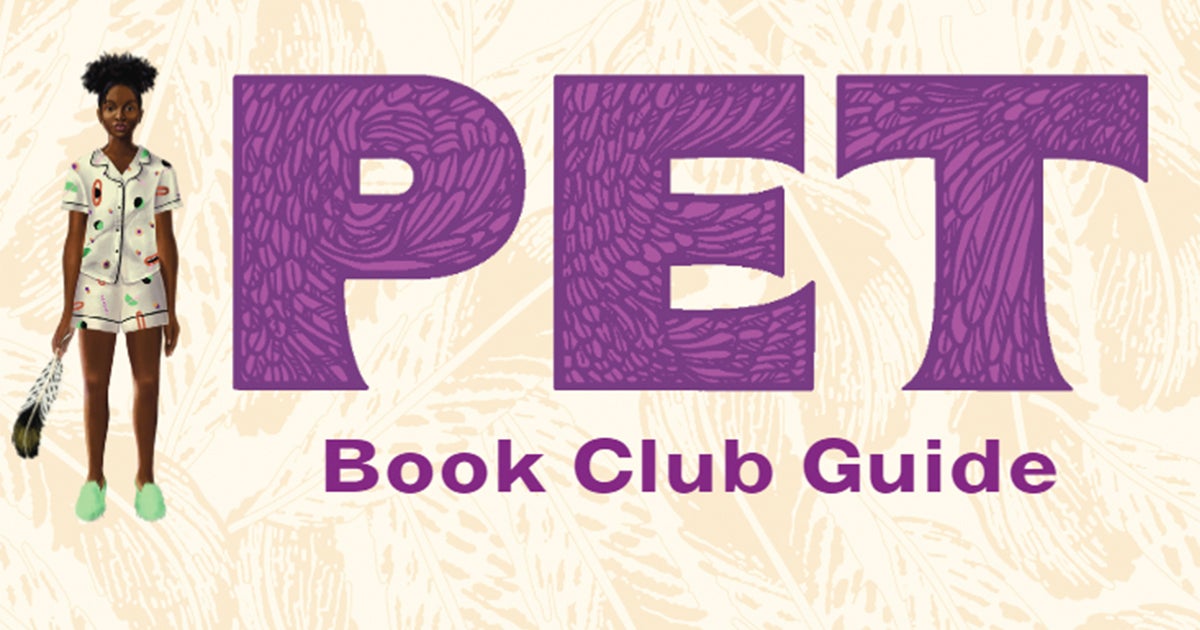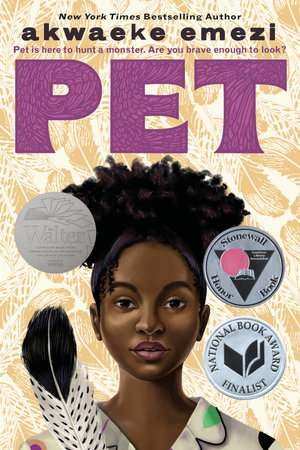One of our favorite Book Nerd activities is going to book club! Book clubs create community, help us get through our TBR pile, discover new faves, and allow space to talk about our favorite characters. To help with your book club endeavors, we’ve created book club guides for some of our favorite YA titles. This PET book club guide will help you get the most out of reading Akwaeke Emezi’s genre-defying novel. Dive into these insightful discussion questions and start the dialogue about the book the New York Times called one of the best books of the year.

Pet Book Club Guide Discussion Questions
- Pet examines language and communication, and how listening and speaking are essential to understanding the world. “When Jam was a toddler, she’d refused to speak, which was why they’d taught her to sign instead. She used her hands and body and face for her words but saved her voice for the most important one[s].” (p. 15) Jam uses her voice to tell Redemption about the monsters and about Pet. Why is this important? Jam decides not to tell Redemption there is a monster in his home. Why does she keep this from him? Describe a time when you or someone you know omitted information at a critical moment. Would you have reacted the same way Redemption did when he discovered what Jam had left out? Talk about the role listening plays in the story.
- The city of Lucille had a revolution to eradicate all the monsters. How does Emezi describe the city prior to the revolution? (pp. 1–3, 78–79) What allusions to current events do you notice?
- Bitter, Jam’s mother, taught her daughter that “a lot of things were manageable as long as they were honest. You could see things clearlyif they were honest; you could decide what to do next, because you knew exactly what you were dealing with.” (p. 7) Give examples of when Jam does not follow this life lesson. What is her rationale for not doing so in each instance?
- Why doesn’t Jam send Pet back into the painting? (pp. 69–70)Art © 2019 by Shyama Golden discussion questions
- Reflect on and respond to the following quotations:
- “I could feel how hungry it was to become real.” (p. 44)
- “If you do not know there are things you do not see . . . then you will not see them because you do not expect them to be there. You think you see everything, so you think everything you see is all there is to be seen.” (pp. 71–72)
- “But the truth does not care about what you want; the truth is what it is. It is not moved by want, it is not a blade of grass to be bent by the wind of your hopes and desires.” (p. 95)
- “All knowledge is good knowledge.” (p. 102) e. “We should’ve known. . . . It’s not that Lucille failed me, it’s more like all of us might have failed Moss, you know?” (p. 149)
- “Masks are useful then; not quite lies, not quite truths. Just decisions about what to be and what to show. Curation.” (p. 152)
- The library is a place to gain knowledge. Discuss how the library and Ube, the librarian, helped Jam and Redemption learn about the revolution and the monsters. Reflect on and respond to the ways in which research (inquiry and information gathering) helped Redemption recognize what was happening in his home.
- Pet “hissed and crackled when Aloe used the word ‘monster.’” (p. 45) Why do Aloe and Bitter view Pet as a monster? How does the term affect the novel’s tone? Discuss ways in which labels confine and define people. Why do we need to be careful with labels?
- Redemption, we see, is a fighter. He explains, “[My opponent and I are] alive when we fight. We’re magnificent; we’re testing our aliveness against each other. How fast is your alive? How smooth is your alive? How hard, how resilient? We’re alive because we can be hurt; we’re alive because we can heal. I think it’s beautiful. It’s why I fight.” (p. 57) Discuss his poetic view of fighting. What is something that you do that makes you feel alive? A sport? An artistic pursuit? 9. “You’re the monster, Hibiscus.” (p. 180) How was Hibiscus’s monstrous behavior discovered? What was his ultimate punishment? Do you think he got what he deserved? Why or why not? 10. What did this book teach you about humanity? What resonated and lingered after you finished reading this book?
Read PET by Akwaeke Emezi
Check out PET
About the Author
Akwaeke Emezi is an honoree on the National Book Foundation’s “5 Under 35” list, a long-list nominee for the Carnegie Medal of Excellence, and a short-list nominee for the Center for Fiction’s First Novel Prize. They continue to receive accolades for their adult debut, Freshwater,and their sophomore adult novel, The Death of Vivek Oji, which was an instant New York Times bestseller. Born in Umuhai and raised in Aba, Nigeria, Akwaeke holds two degrees, including an MPA from New York University, and lives in liminal spaces.


